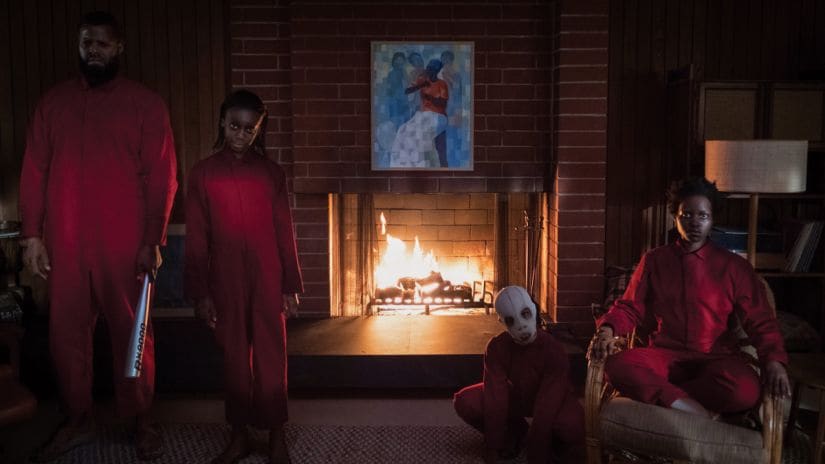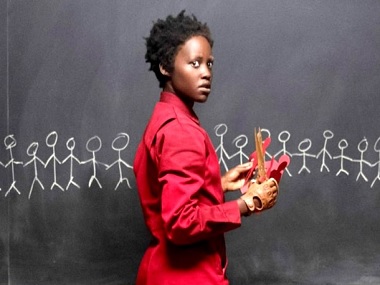The Wilsons, an affluent black family’s lazy night at a countryside retreat is intruded by another family, dressed in orange prisoner uniform-like clothes. They break into the house, displaying superhuman strength, spooky personality traits, and faces identical to the Wilsons. Freaked out by the unwarranted out-of-body experience, Gabe Wilson (Winston Duke) asks them, “What are you?”. In response, they say, “We’re Americans”. [caption id=“attachment_6337661” align=“alignnone” width=“825”]
 A still from Us. YouTube[/caption]
_Read: Us movie review: Jordan Peele's thought-provoking slasher film suffers from an implausible reveal_ It is a masterstroke by director Jordan Peele delivered in a key scene from his recent release Us. Till that juncture, the narrative of this supernatural/psychological thriller is limited to the personal turmoil of Adelaide Wilson (Lupita Nyong’o) and her family. But with that declaration, the film assumes a political undertone. Post that scene, every thrill served is a sledgehammer shot to not only the pulse of his audience but also the complacency of those who have overlooked or made peace with the divisive approach of US President Donald Trump’s administration. It only strikes one, right at the end, that Peele’s Get Out follow-up was always a political comment on what is happening in the US. To break things down, refer to the title in fresh light: US. The existence of lookalikes is not limited to the Wilson family. As news channels blare out from TV sets, it is a nationwide phenomenon as ghostly doppelgangers have ascended from the expansive underground network of the US and taken to the streets, hunting down their human counterparts and ‘untethering’ them (slashing their throats with scissors). These lookalikes — can collectively be called ‘Us’ — form an interminable human chain, presumably across the US-Mexico border. It is yet another reference to Trump’s longstanding intention to build a wall across the US-Mexico border to prevent the Mexicans from ‘plundering’ America. This human chain is also a reference, earlier in the film, to a real-life event in the late 1980s where Americans reunited to spread awareness about hunger in the country. Adelaide, probably six or seven years old, watches the public service announcement on TV, but instantly switches the channel to something more popcorn. This lack of empathy comes back to haunt her later in the film. The lack of empathy, coupled with the fears of her mother, also triggers the process of otherisation within her from childhood. Her mom discourages her from taking a giant wheel ride by instilling fear in her that she is “too young” for it. This fear, along with a dozen others of different kinds, manifests itself into Red, her eerie counterpart from the underground. Thus, with this manifestation(?), Peele draws a parallel between the underbelly of the US and the recesses buried deep within the protagonist. He suggests that the darkest fears of humans snowball into issues of national interest and international disharmony. What passed on from Adelaide’s mother to her carries forward with her children, Zora and Jason Wilson. Zora’s lookalike has the ability to run very fast, a trait that Adelaide must have prevented Zora from picking up through restrictions on the daughter’s movement, that stemmed from the mother’s own childhood fear. Similarly, Jason’s lookalike loves to play with fire and wears a mask to cover his disfigured face. Adelaide must have always kept a watch on Jason’s increasing affinity with fire and ensured that he does not end up with a burnt face. So the fear of fire that she would have cultivated in Jason ends up haunting him in the form of his fire-spitting doppelganger. Through a few instances, Peele also comments on the global hazard that is the ‘manufacturing of consent’. Zora and Jason, devoid of the option of going out to play in the woods, end up craving for WiFi. Besides the Internet, Peele also stresses on how pop culture is used as a tool by politicians to distract the public from bigger and more burning issues. In one such instance, Peele shows a family getting brutally murdered as a playlist of popular, foot-tapping songs unfurls on an Alexa-like smart speaker. There is also a scene where Gabe suggests trapping the intruders in Home Alone-style, much to the chagrin of his wife who is shocked to learn that his safety mechanism relies only on kids movies. And in the most interesting reference, Jason wears a Jaws T-shirt at the haunted Santa Cruz beach. However, sharks seem to be the least of his concerns, as his back faces the same mirror maze where his mother’s childhood trauma had begun. Through that scene, Peele underlines yet again why horror does not reside in the depths of the ocean, but in those of the human conscience.
Jordan Peele establishes a mirroring relationship between the people of the US and its government, by underlining that personal fears often snowball into issues of international discord.
Advertisement
End of Article
Written by Devansh Sharma
Twitter handle - @inkedinwhite see more


)
)
)
)
)
)
)
)
)



